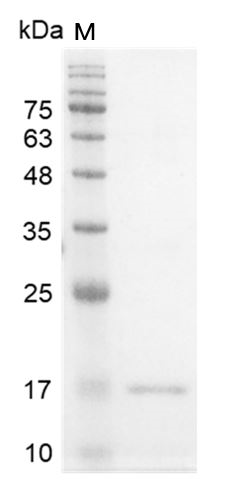| Product name | Human IFN-γ protein, His tag (Animal-Free) |
| Sequence | Amino acid sequence derived from Human IFN-γ protein (Gln24-Gln166)(P01579) was expressed with 6×His tag at the C-terminus |
| Applications | His tag |
| Applications notes | Human |
| Activity | Measure by its ability to induce cytotoxicity in HT29 cells. The ED₅₀ for this effect is <1 ng/mL. The specific activity of recombinant human IFN gamma is approximately >2 x 10⁶ IU/mg. |
| Protein length | The secreted recombinant Human IFN-γ consists of 143 amino acids and has a predicted molecular mass of 17.7 kDa |
| Preparation method | E. coli |
| Purity | >95% as determined by SDS-PAGE. |
| Alternative | Type II interferon, T-cell interferon, MAF |
| Formulation | Lyophilized from sterile PBS, pH 8.0 |
| Features & Benefits | Endotoxin:<0.01 EU per 1 μg of the protein by the LAL method. |
| Molecular weight | The protein has a calculated MW of 17.7 kDa. The protein migrates as 17 kDa under reducing condition (SDS-PAGE analysis). |
| Usage notes | Always centrifuge tubes before opening. It is recommended to reconstitute the lyophilized recombinant Human IFN-γ protein to a concentration of 0.1-1 mg/mL in sterile ddH2O, and keep at room temperature for at least 20 min to fully dissolve. Please avoid vortex vigorously |
| Storage instructions | Lyophilized protein product should be stored desiccated below -18°C. Upon reconstitution, the protein should be stored at 4°C between 2-7 days and for future use below -18°C. For long term storage it is recommended to add a carrier protein (5% HSA , 10%FBS or 0.1%BSA). Please prevent freeze-thaw cycles |
| Shipping | Gel pack with blue ice. |
| Precautions | The product listed herein is for research use only and is not intended for use in human or clinical diagnosis. Suggested applications of our products are not recommendations to use our products in violation of any patent or as a license. We cannot be responsible for patent infringements or other violations that may occur with the use of this product. |
| Background | IFN-γ, also known as IFNG, is a secreted protein which belongs to the typeⅡinterferon family. IFN-γ is produced predominantly by natural killer and natural killer T cells as part of the innate immune response, and by CD4 and CD8 cytotoxic T lymphocyte effector T cells once antigen-specific immunity develops. IFN-γ has antiviral, immunoregulatory, and anti-tumor properties. IFN-γ, in addition to having antiviral activity, has important immunoregulatory functions, it is a potent activator of macrophages, and has antiproliferative effects on transformed cells and it can potentiate the antiviral and antitumor effects of the type I interferons. The IFN-γ monomer consists of a core of six α-helices and an extended unfolded sequence in the C-terminal region. IFN-γ is critical for innate and adaptive immunity against viral and intracellular bacterial infections and for tumor control. Aberrant IFN-γ expression is associated with a number of autoinflammatory and autoimmune diseases. The importance of IFN-γ in the immune system stems in part from its ability to inhibit viral replication directly, and most importantly from its immunostimulatory and immunomodulatory effects. IFNG also promotes NK cell activity. |
| Alternative | Type II interferon, T-cell interferon, MAF |
| Accession | P01579 |

Fig.SDS-PAGE analysis of Human IFN-γ protein
You must be logged in to post a review.
Reviews
There are no reviews yet.